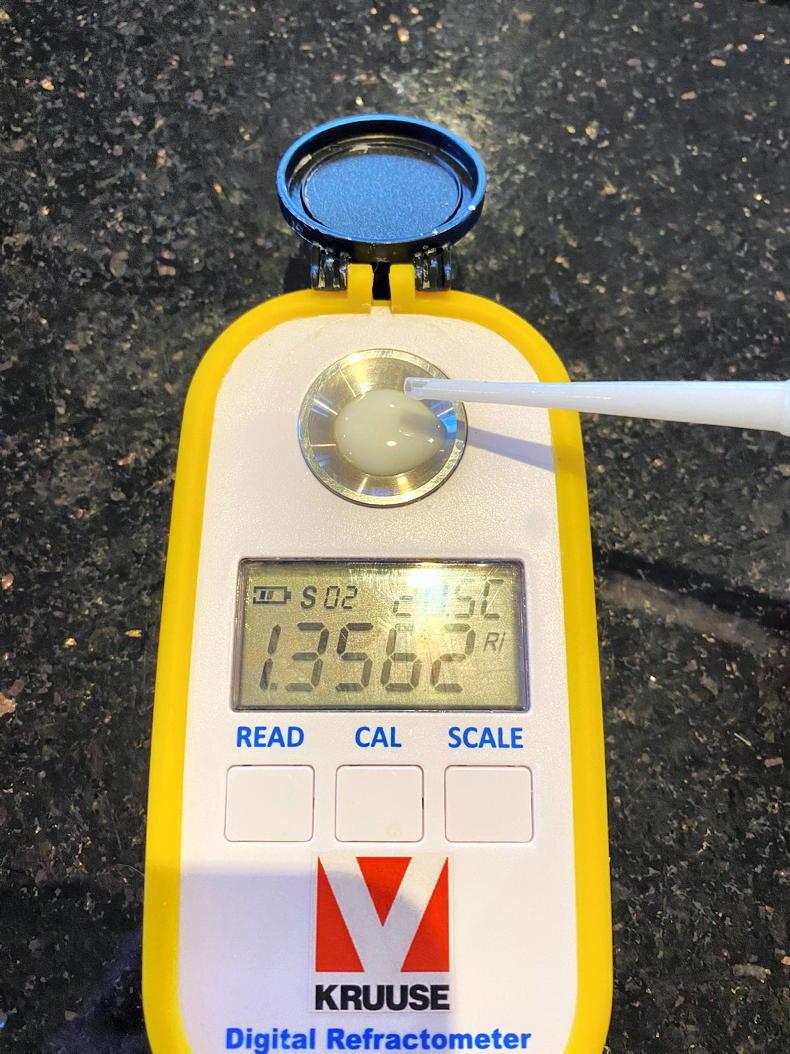Timely mineral supplementation and correct nutrition before lambing can improve the quality of ewe colostrum, according to student Jane Tempany.
Ewes provided with additional mineral supplementation in advance of lambing were proven to have a higher concentration of antibodies, which are essential for early life lamb health.
Jane is a fifth year student at Ursuline College, Sligo, and farms in Skreen with her parents Jim and Sinéad and siblings Mark and Ellen.
As part of this weekend’s SciFest National STEM competition, Tempany’s research on the factors that impact and improve sheep colostrum will be presented to judges.
Sheep farming in lockdown
The Sligo student described the theory behind her research.
She said: “During lockdown of third year and transition year, I was farming more with my brother and father. I was always wondering about the impact of nutrition on our sheep.”
Tempany described how, with the support of her father, brother and uncle Peadar, she decided to include 13 of their predominantly Texel- and Suffolk-cross ewes in a study to determine the impact of mineral supplementation on colostrum quality.
Study
“We tested 13 ewes, all carrying singles, as we didn’t want to deprive any of the ewes which were carrying multiples. The flock of 13 was split into two groups."
Seven were assigned as the experimental group. These ewes received the usual care and feeding of grass and lick buckets, as well as a powdered mineral supplement through some meal.
The six other ewes designated to the control group were maintained on grass and lick buckets only.
The ewes were supplemented for a period between two-and-a-half and five weeks prior to lambing.
Lambing
Tempany explained: “Once they had given birth, we collected colostrum samples from the ewes and, with the support of my dad, brother and teachers, brought these to a Brix refractometer and examined the percentage of immunoglobulins each contained."
Immunoglobulins, also known as antibodies, are glycoprotein molecules found in colostrum which are essential for transferring immunity from disease to protect lambs in early life.
“Any colostrum with an immunoglobulin concentration lower than 21% requires additional supplementation of replacement colostrum to lambs,” Tempany said.

The Brix refractometer used to analyse colostrum quality.
“The control group not fed additional minerals through a powdered supplement had a score of 27.5%. The experimental group, which were fed the additional minerals, had a score of 28%."
Tempany reported that the ewes in the experimental group that were supplemented for more than three weeks before lambing had immunoglobulin concentrations as high as 30.9%.
“It was also observed that the ewes which were supplemented longer had bigger and better elders,” she added.
Next steps
The Sligo student said to test her research further, farmers could blood test lambs to determine the level of antibodies they have received through the ewe’s colostrum.

Jane Tempany with her sheep at Skreen, Co Sligo.
While she’s unsure of what she hopes to study in future, Tempany said: "I’ve been living on a farm since I was born and have always had an interest."
She said the project was “practical and appealing” and thanked her biology teacher Mr Carolan, the Ursuline College and SciFest for their encouragement and support.
Timely mineral supplementation and correct nutrition before lambing can improve the quality of ewe colostrum, according to student Jane Tempany.
Ewes provided with additional mineral supplementation in advance of lambing were proven to have a higher concentration of antibodies, which are essential for early life lamb health.
Jane is a fifth year student at Ursuline College, Sligo, and farms in Skreen with her parents Jim and Sinéad and siblings Mark and Ellen.
As part of this weekend’s SciFest National STEM competition, Tempany’s research on the factors that impact and improve sheep colostrum will be presented to judges.
Sheep farming in lockdown
The Sligo student described the theory behind her research.
She said: “During lockdown of third year and transition year, I was farming more with my brother and father. I was always wondering about the impact of nutrition on our sheep.”
Tempany described how, with the support of her father, brother and uncle Peadar, she decided to include 13 of their predominantly Texel- and Suffolk-cross ewes in a study to determine the impact of mineral supplementation on colostrum quality.
Study
“We tested 13 ewes, all carrying singles, as we didn’t want to deprive any of the ewes which were carrying multiples. The flock of 13 was split into two groups."
Seven were assigned as the experimental group. These ewes received the usual care and feeding of grass and lick buckets, as well as a powdered mineral supplement through some meal.
The six other ewes designated to the control group were maintained on grass and lick buckets only.
The ewes were supplemented for a period between two-and-a-half and five weeks prior to lambing.
Lambing
Tempany explained: “Once they had given birth, we collected colostrum samples from the ewes and, with the support of my dad, brother and teachers, brought these to a Brix refractometer and examined the percentage of immunoglobulins each contained."
Immunoglobulins, also known as antibodies, are glycoprotein molecules found in colostrum which are essential for transferring immunity from disease to protect lambs in early life.
“Any colostrum with an immunoglobulin concentration lower than 21% requires additional supplementation of replacement colostrum to lambs,” Tempany said.

The Brix refractometer used to analyse colostrum quality.
“The control group not fed additional minerals through a powdered supplement had a score of 27.5%. The experimental group, which were fed the additional minerals, had a score of 28%."
Tempany reported that the ewes in the experimental group that were supplemented for more than three weeks before lambing had immunoglobulin concentrations as high as 30.9%.
“It was also observed that the ewes which were supplemented longer had bigger and better elders,” she added.
Next steps
The Sligo student said to test her research further, farmers could blood test lambs to determine the level of antibodies they have received through the ewe’s colostrum.

Jane Tempany with her sheep at Skreen, Co Sligo.
While she’s unsure of what she hopes to study in future, Tempany said: "I’ve been living on a farm since I was born and have always had an interest."
She said the project was “practical and appealing” and thanked her biology teacher Mr Carolan, the Ursuline College and SciFest for their encouragement and support.








 This is a subscriber-only article
This is a subscriber-only article










SHARING OPTIONS: